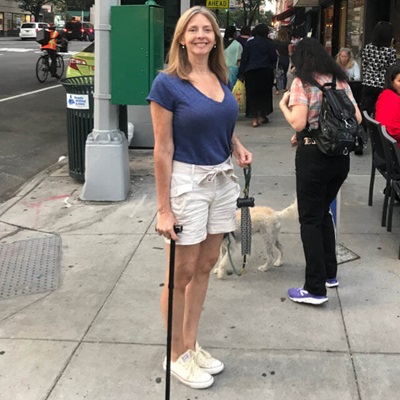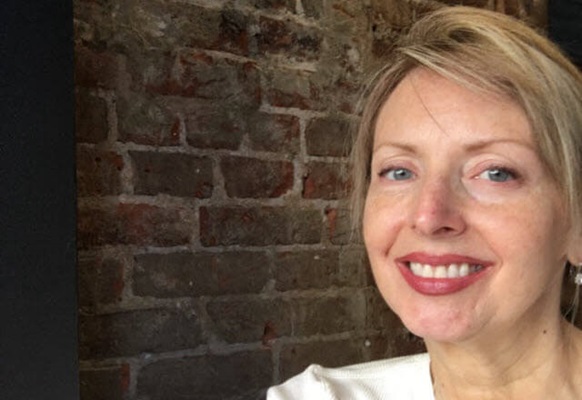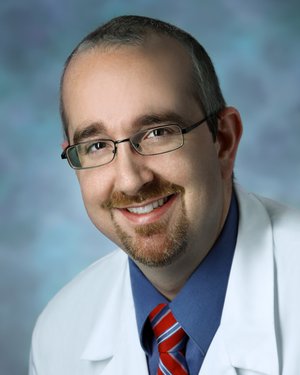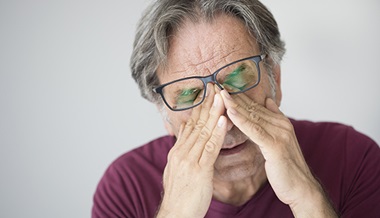Patient Story
Stiff Person Syndrome: Gay's Story

Patient Story Highlights
- Gay, a former real estate professional, was experiencing debilitating stiffness and spasms in her legs.
- Trying to solve the mystery of her symptoms, she learned about stiff person syndrome (SPS), a very rare disease with symptoms that matched hers.
- Gay sought treatment with Dr. Scott Newsome at Johns Hopkins' Stiff Person Syndrome Center, a world-renowned center for research.
Working as a design and construction project manager for a top-flight realty firm in New York City was a stressful and demanding job, both physically and mentally. Gay was handling the role just fine.
But in 2004, that changed. She started noticing a combination of pain and weakness in her legs, along with muscle stiffness that she describes as excruciating. Exercise made the pain even worse.
Gay was already living with some autoimmune and musculoskeletal issues, including osteoarthritis. She wondered: Was this a worsening of those conditions, or something new?
Searching for Answers
As her situation progressed, Gay sought help from a range of doctors, but none of their treatments seemed to help. “I was barely functioning,” she says.
By 2015 she needed crutches, and was close to becoming wheelchair-bound.
As most people in her situation would do, Gay went online to try to find out what was happening to her. Her search led her to a condition with symptoms that seemed to match the pattern of what she was going through. It was extraordinarily rare: stiff person syndrome.
Stiff Person Syndrome
Stiff person syndrome (also known as SPS) affects only one to three people per million, most of whom are women. It’s most likely to strike people who are already living with autoimmune disorders such as type 1 diabetes.
“It’s a diagnosis of exclusion,” explains Scott Newsome, D.O., F.A.A.N., director of the Stiff Person Syndrome Center at Johns Hopkins.
The main symptoms are pain and a progressive stiffness that most commonly starts in the legs and lower back. Severe, painful spasms can result from sudden movement, being startled by loud noises, or even an emotional shock. Doctors can treat these symptoms, but research has yet to yield a solution for eliminating SPS entirely.
Indeed, SPS is so rare that Gay’s doctor was hesitant to test her for it. But at Gay’s urging he relented, and her blood showed the telltale antibodies indicating the condition.
The entire team was amazingly thorough, smart and thoughtful. Dr. Newsome really listens to his patients."
Gay

An Expert in Stiff Person Syndrome
Only a handful of clinics around the world address SPS, and one is the Johns Hopkins center. With encouragement from her older brother, a medical expert at another major hospital, Gay made the trip to Baltimore and met with Dr. Newsome.“Having an accurate diagnosis and treatment plan is comforting to say the least,” Gay says. “The entire team was amazingly thorough, smart and thoughtful. Dr. Newsome really listens to his patients.
In fact, Dr. Newsome and his team have listened to and treated many patients with stiff person syndrome. The Johns Hopkins Stiff Person Syndrome Center is one of the largest research centers for the condition in the world, with a huge repository of data from following more than 100 patients over many years.
Individualized, Multi-faceted Treatment
Dr. Newsome says, “For Gay, as in the case of any individual with stiff person syndrome, we apply a more personalized medicine approach, assessing what the needs of the patient are, and then matching those needs with both medicine and non-pharmacologic treatments.“Treating stiff person syndrome requires more than just medicine. You need a holistic, multi-faceted approach. With Gay, we started a course of oral medications followed by infusions to address both her symptoms and her immune system. We also encouraged her to participate in aqua therapy, stretching, yoga, Pilates and acupuncture.”
What works for one person with SPS may not work for another. Realizing this, Gay is careful to follow Dr. Newsome’s personalized plan to help minimize the impact of her symptoms.

Taking Care of Herself, with Help from a Friend
“As part of my individualized treatment plan, I take part in very light exercise, which is monitored by Dr. Newsome. I eat as healthy as possible and I eat smaller portions to avoid spasms in my esophagus. I take care to not get exhausted, and spend time around friends and family.”Emotional support is no small part of dealing with SPS. Gay adopted “Señor,” a little homeless dog from Puerto Rico, and he has become an essential part of her self-care. Gay appreciates Señor’s unconditional love, especially when she experiences a fall or a particularly painful stretch. “He’s very intuitive,” she says of her canine companion.
Dr. Newsome says, “Gay has been vigilant in incorporating all the non-medical aspects of her personal plan, and it’s improved her life.”
Awaiting a Breakthrough, Staying Hopeful
Though stiff person syndrome still presents more questions than answers, Gay says, “Anyone getting this diagnosis can take positive action, especially if they can work with a specialist who understands the complexities of the illness.“Meeting Dr. Newsome changed my life. I put myself in the hands of one of the country’s top authorities on stiff person syndrome, and this gave me great comfort. While we have not beaten my stiff person syndrome, we’ve slowed the progression.
“I’m confident that Johns Hopkins will make progress in controlling this sneaky, painful and debilitating disease,” says Gay. “And that gives even my tough days a silver lining.”
Gay's Doctor
Scott Douglas Newsome, D.O.

Expertise: CNS Autoimmune/Inflammatory Disorders, Multiple Sclerosis, Neurology, Neuromyelitis Optica, Optic Neuritis
Stiff Person Syndrome Center at Johns Hopkins
An experienced treatment team is important in managing SPS. Our specialized center, led by Scott Newsome, D.O., combines experts in neurology, immunology, ophthalmology, neuromuscular disease and other specialties to offer comprehensive care for people with SPS.


